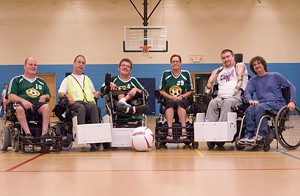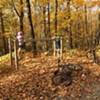Published August 4, 2010 at 7:00 a.m.
After this summer’s World Cup fever, it’s probably safe to say that most people know the most basic rule about soccer: no hands. Except for throw-ins and goalkeeper moves, players must kick the ball.
But what if you haven’t felt your feet since you were in an accident, or haven’t had control of your limbs since birth? What if your mobility depends not on your legs or your arms but on a joystick that moves your wheelchair?
You can still play the “beautiful game.” That’s what some 15 athletes are demonstrating on a recent Sunday afternoon in the University of Vermont’s Patrick Gymnasium, where the Vermont Chargers are engaged in a fierce match against Syracuse’s CNY United.
The adrenaline and effort are palpable in the room, the air occasionally pierced by a ref’s whistle. Players are kicking, dribbling and passing the ball — even though their toes never actually touch the 13-inch-diameter sphere. And, to the groans of the Green Mountain fans, the upstate New York team is scoring goal after goal.
No matter. Just being on the court feels like a victory, says Zak Schmoll, a UVM sophomore who has spinal muscular atrophy.
The self-professed sports nut from Orange, Vt., helped organize today’s game. While sports for individuals with disabilities are on the rise across the country, competitive opportunities have been scant for quadriplegics and others who use power wheelchairs, Schmoll explains.
But now power soccer — designed specifically for people in power wheelchairs — is leveling the playing field. It’s also growing quickly: The number of teams nationwide has increased tenfold, from six to 60, since 2001. The Vermont Chargers started in March, and they’re here today not only to play the match but to introduce potential players to the game.
“It’s great to have a sport where we don’t need to change the rules for me to play,” says Schmoll during a break. “I used to watch other sports; now people are watching me.”
Imagine a hybrid of football, hockey and soccer on wheels. That’s what power soccer looked like when it began in the U.S. in the late 1980s, explains Jerry Frick, the eastern regional director of the United States Power Soccer Association (USPSA). Smitten with disabled sports after he broke his neck in a motorcycle accident at age 19, Frick says he favors power soccer because of the team aspect. He’s traveled to Burlington from his home base in Atlanta to help teach the basics.
After several meetings and matches with power-soccer players in France and Japan, the nonprofit USPSA eventually adopted more soccer-like rules. Typically played on an indoor basketball court, the game consists of two teams of four (including a goalkeeper on each end) in chairs that are generally hand controlled and are equipped to “kick” using a polycarbonate or metal foot guard. Every once in a while at Patrick Gym, chairs collide with a loud bang.
“Things break; there’s a lot of force out there,” admits Ken Keppel, who, as the tech for CNY United, repairs chairs. “We’ve had a few tipovers.”
But this is no murderball — the rough-and-tumble wheelchair rugby that was the subject of a documentary in 2005. In power soccer, contact is avoided, injuries are rare, and the focus is on finesse. “Just like able-bodied soccer, players attack, defend, outmaneuver and work as a team to be able to score on the opponent,” explains Frick. “If you can control the chair, you can play power soccer.”
The organizers’ ultimate goal, says Frick, is to get power soccer on the Paralympic roster for the Rio 2016 Games. That could happen if they complete a classification system — which divides the various levels of players — this October at a meeting in Vancouver, and if there are enough players and matches worldwide for the International Paralympic Committee, a group as discerning as its Olympic counterpart about accepting new sports. In the meantime, dozens of teams have formed, from Los Angeles to Boston, and new leagues are starting up at colleges.
“Power soccer has had a really strong presence from the beginning, because people in power chairs have been mostly excluded from participation in sports,” says Patrick Standen, the Burlington-based founder and president of the Northeast Disabled Athletic Association. “They want to be competitive but didn’t have the avenue.”
Power soccer even has its own Pelé: Jérôme “Pika” Durand. Having mastered the game in France, Durand now plays for the Atlanta Synergy. He’s come to Patrick Gym today to show off his skills. Vermont Chargers coach Sandy Craige, studying Durand’s moves from the sidelines, explains that success in power soccer often entails communication and eye contact, which power-wheelchair users aren’t always comfortable with.
But after an hour or so on the court, something changes. There’s better team coordination and interaction, and players who once held back begin, well, charging.
“It’s helping their self-esteem a lot, which is just so big,” says Craige, who began using a wheelchair after a sledding accident in 1980. “When I first got hurt, there was nothing out there, and I had so many people helping me out — this is like giving back to the next generation.”
Though kids as young as 3 or 4 can play power soccer, the game is promoted for anyone “5 to 105,” says Frick. Chargers members range in age from 19 (Schmoll) to, well, old enough to be a grandmother (Linda Salmon). The team is coed, though men currently outnumber women.
One of the new women here today is Jamie Perron, 28, a ripe young recruit to the sport. Having seen a news snippet on the clinic, she came from Jeffersonville with her parents to check it out in person. So far, she has mixed feelings. “It’s a little overwhelming,” says Perron, who was disabled in a car accident nine years ago. “They go really fast.”
Playing out of town also can be daunting to power-soccer players. As Frick explains, most athletes have to travel with their caretakers. “If you fly somewhere, it’s not one plane ticket, it’s two,” he says. Frick advises teams on creating a 501(c)(3) and seeking fundraising opportunities, and he recruits players by handing out DVDs at places such as Walmart.
“We’re just trying to reach out to anybody that we can,” he says. “Power soccer has changed my life, [and] changed the lives of all these players you see out here.”
It’s also changing perceptions of what makes a good game for spectators. Halfway through the match, two guys walk in with ear-to-ear grins carrying a bright yellow sign that reads “Zak Attack” — referring to Zak Schmoll — and a couple of green vuvuzelas, the noisemakers that were ubiquitous at the World Cup in South Africa. But you can barely hear a honk over the shouts of the players, coaches and fans. As for Schmoll, he’s too focused on his moves to notice the arrival of his friends.
After the flurry of today’s activity, the Vermont Chargers will resume their weekly practices at the Miller Recreation Center, perhaps with a couple of new players. One of the veterans, Scott Goyette of Burlington, catches his breath on the sidelines. “Your adrenaline definitely gets going; you have to react to what’s going on,” he says. “You’re basically just pushing a button, but your heart races. It’s awesome.”
More By This Author
About the Artist

Matthew Thorsen
Bio:
Matthew Thorsen was a photographer for Seven Days 1995-2018. Read all about his life and work here.
Matthew Thorsen was a photographer for Seven Days 1995-2018. Read all about his life and work here.
Speaking of...
-

UVM Swimming and Diving Overcomes Budget Cuts to Win Conference for the First Time in Its History
Mar 13, 2024 -

Two Vermont Teens Take On the Cross-Country Junior National Championships
Mar 6, 2024 -

Youth Soccer Comes of Age in Vermont, but the Playing Field Is Hardly Level
Nov 1, 2023 -

In a Classic Vermont Mountain Road Rally, Winning Takes Precision and Smarts, Not Speed
Sep 20, 2023 -

True Grit: Gravel Biking in Vermont Is Gaining Traction and Building Community
Apr 26, 2023 - More »
Comments
Comments are closed.
From 2014-2020, Seven Days allowed readers to comment on all stories posted on our website. While we've appreciated the suggestions and insights, right now Seven Days is prioritizing our core mission — producing high-quality, responsible local journalism — over moderating online debates between readers.
To criticize, correct or praise our reporting, please send us a letter to the editor or send us a tip. We’ll check it out and report the results.
Online comments may return when we have better tech tools for managing them. Thanks for reading.















































